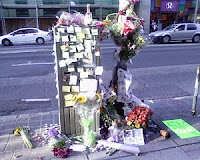 |
| C. Le Brun. from Wellcome Images via Wikimedia commons |
Our society, and the pundits, academics, publicists and others who speak, or claim to speak for it, frequently display a profound unease with the anger of the oppressed. That unease frequently manifests itself not in cogent criticism but in unthinking rejection, or worse, violence: the violence of a direct attack or the violence of a judicial blind eye.
Recently, Sun Columnist Anthony Furey provided an example of this kind of reaction to the anger of the oppressed:
...in front of the U.S. consulate something more troubling was underway.At an anti-Trump rally, Black Lives Matter Toronto co-founder Yusra Khoghali took the mic. She wouldn’t celebrate the trending hashtag #PrayforQuebecCity because, she claimed, “Quebec City is a white supremacist settler colony.” Then she explained “Justin Trudeau is a white supremacist terrorist”.“
Nobody has to agree with what Yusra Khogali said. Reason may answer what she said; her rage should have an answer based on something more than fear. Calling her rhetoric "troubling" appeals only to fear without specific and clear answers to the claims she makes. Answering the rage of the oppressed with fear, and worse, with repression based on fear, produces nothing but gross injustice.Rise up and fight back,” she told the cheering crowd. “Look at us, we have the numbers.” This is the same Khogali who tweeted out a year ago: “Plz Allah give me the strength to not cuss/kill these men and white folks out here today.”
 |
| by Christopher Kaiser reproduced by permission |
Darcy Sheppard was angry. After his fatal encounter with Micheal Bryant, photos surfaced of him expressing anger at another motorist. That doomed his hopes for any kind of justice. Once the defence could portray Darcy Sheppard as a man who got angry, the prosecution said they saw no hope of a conviction.
 |
| by MadChester via Wikipedia |
No comments:
Post a Comment